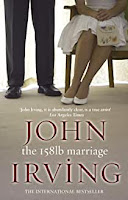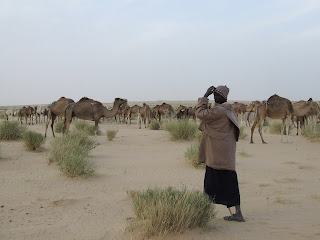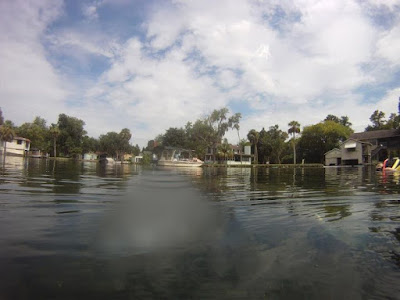John Ironmonger (author of 'Not Forgetting the Whale' - and other books) ... blogging about life, and travel, and books, and family, and writing, and Javan rhinos ...
A new cover is announced: Der Eisbar und die Hoffnung auf morgen (The Wager and the Bear) [24 Oct 2022]
My Book Shelves (5): 'Slaughterhouse 5,' by Kurt Vonnegut [22nd Oct 2022]
Slaughterhouse 5 by Kurt Vonnegut: *****
I was eighteen when I first read Slaughterhouse 5. At the time I was reading nothing but science fiction. I had an insatiable appetite for sci fi novels – especially American ones; I could read three or four in a week. And I did. And so, when Slaughterhouse-5 came along I bought the paperback and added it to my pile along with unread Asimovs and Bradburys unaware that this book would change my reading habits forever.
But right away
this was clearly a different book. It starts with this unusual introduction.
So Vonnegut had been there for the fire-bombing as a prisoner of war. Well. I read on.
The first
chapter begins:
ALL OF THIS HAPPENED, more or less. The war parts anyway are pretty much true. One guy I knew really was shot in Dresden for taking a teapot that wasn’t his. Another guy I knew really did threaten to have his personal enemies killed by hired gunmen after the war. And so on. I’ve changed all the names.
An odd blurring
of fiction and truth then. And right away Vonnegut himself becomes a presence in the story – there as the
writer setting this all down, offering us his own wry observations about life,
and politics, and the state of the world. Later in that first chapter, Vonnegut tells us he found it
hard to write about his experiences in Dresden.
“I thought it would be easy for me to write about the destruction of Dresden, since all I would have to do would be to report what I had seen. And I thought too that it would be a masterpiece or at least make me a lot of money, since the subject was so big. But not many words about Dresden came from my mind… And not many words come now either.”
Slaughterhouse
5 then, appears to be Vonnegut’s way of making amends with his memory. Writing
about a night when 45 thousand people (or more) were killed was simply too
painful. Instead, he gives us a science fiction tale – the story of Billy Pilgrim
– an optometrist - who has become unstuck in time after being abducted by
aliens from the planet Tralfamadore. Time for these aliens is a fluid concept,
and so it has become for Pilgrim. And so he visits incidents in his own life,
like a mosaic, randomly discovering himself in old age, and then again in youth,
and then again in Dresden. It is easy to argue that Vonnegut robbed the story
of some of its force with this narrative device; but he also sets it into
perspective – the perspective of a whole life with its highs and lows and
dreadful mistakes.
Perhaps the
most revolutionary thing about Slaughterhouse 5 is not the content, but the style. Vonnegut speaks
to us directly. He gives us short paragraphs. Short sentences. Vignettes of a scene.
Asides. Sometimes paragraphs end with the writer’s own resignation of defeat – ‘So
it goes.’
I’ve read a lot
more Vonnegut since. Nothing else is as good. Most of the titles I barely
remember. But Slaughterhouse 5 was, if not the last pulp sci fi novel I read, certainly
the reason I drifted away from the genre in my twenties. I found something in
this book that made me want more than fanciful ideas and aliens. Slaughterhouse 5 didn't make me a writer. But it did make me a reader.
Please check out my website for more information on my books. https://www.johnironmonger.com
My Book Shelves (4): 'Address Unknown,' by Katherine Kressmann Taylor [22 Oct 2022]
'Address Unknown' by Katherine Kressmann Taylor: *****
'Address Unknown’ is an exquisite and deeply moving piece of writing. It is the profoundly intimate and troubling exploration of a friendship torn apart by the cult-like power of nationalism; an excoriating and unsettling unravelling of human nature... but with just about the best ending you will ever encounter in literature. Whenever I visit a book-club, this is always the book I recommend for the group to read next. People have written to thank me. Imagine that.
It’s a novella. Only 64 pages. So short you can read it all in one sitting. And the only essential thing you need to know is that it was written in 1935 – four years before World War II, which makes it frighteningly prophetic. I don’t want to tell you too much more. But if I had to force you to read one book from my library this would be it.
I don’t know
much about Katherine Kressman Taylor beyond the bare details of her life from
Wikipedia. She was born in 1903 in Portland Oregon. She died in Minnesota in
1996. She only wrote one other book. (I haven’t read it.) But with ‘Address Unknown’ she sealed her
immortality.
Please check out my website for more information on my books. https://www.johnironmonger.com
My Book Shelves (3): 'The Goldfinch,' by Donna Tartt [21 Oct 2022]
The Goldfinch by Donna Tartt *****
And so we
waited for another Donna Tartt novel. We had to wait ten years. When ‘The
Little Friend,’ launched in 2002 it was almost an anti-climax. Yes, it was
good. It was very good. But was it good enough? I notice that ‘The Secret History,’ earns 4.16 stars
on Goodreads.com (it deserves better but,
hey, Goodreads is famously brutal) while ‘The Little Friend’ only scores 3.47.
That is perhaps a fair reflection of the disappointment.
Eleven years
went by. In 2013 we were rewarded for our patience, and our reward was ‘The Goldfinch.’
I suppose for completeness I should say that ‘The Goldfinch’ scores 3.93 on Goodreads. I would give it five stars. But it is a demanding read – and the 11% of readers who hated it (and whose ratings bring down the total) probably struggled to get through its 770 pages. For me, it is an almost perfect book. I calculated once that Donna Tartt’s writing pace seems to be around 70 words a day. I’m not suggesting that she sits down and bashes out seventy words and then takes the rest of the day off. No writer works like that. But I am suggesting that she crafts her words with a kind of absolute precision, as if she was a jeweller working on a ruby rather than a painter working on a house. You get the sense that every word has been examined and every sentence weighed so you can tap them like a wine glass and hear them hum.
I like life
stories in fiction. (See My Book List no 2 on John Irving). It is wonderful to watch
a character develop from innocence into adulthood, a journey always laden with
narrative potential. Tartt gives us the coming of age of Theo Decker who loses
his mother in a terrorist bombing at a New York gallery, but who remarkably
ends up rescuing and concealing a painting from the ruins. The painting is “The Goldfinch” by Carel Fabritius. We follow Theo’s
life from here, to a soulless estate outside Las Vegas, to New York society, to
the underworld of Amsterdam. It’s a love story. It’s a tale of personal loss
and self-destruction. It’s a story of redemption. Of a sort. Perhaps it is a
little too long (see also John Irving). Perhaps the ending is a little too
Hollywood. But it feels right nonetheless. I loved it.
And once you
finish reading, I suggest we pencil 2025 into the calendar to start looking
for the next Donna Tartt novel. I hope.
Please check out my website for more information on my books. https://www.johnironmonger.com
My Book Shelves (2): 'On Broadway,' by Damon Runyon. [20th Oct 2022]
Runyon On Broadway: *****
OK - I’m a realist. I know I won’t convince you to pick up a book of Damon Runyon stories unless you’re already a fan. Why would you? These were comic tales written in the 1930s. They’re not terribly relevant to the world of 2022. They are written in a curiously unique style which takes some getting used to, and they employ a vocabulary of jargon that is never adequately translated. They may even be out of print. So I get it. However much I twist your metaphorical arm you’ll find something else to read first. But let me tell you, please, what you’re missing.
These stories are masterpieces of literature. Each one is an exercise in perfection. Damon Runyon was a newspaperman in New York during the prohibition years. He wrote around 100 short stories during this time. They are not long. An average story is about twelve pages. But in those pages Runyon creates rich comic characters and extraordinary situations, and every story resolves itself with a gratifying (if occasionally murderous) twist. Various collections of his ‘Broadway’ stories were published – but today the cream of the cream appear in two volumes – ‘On Broadway’ with around 45 stories, and ‘From First to Last,’ which includes 33. The stories unravel among the low life hoodlums and criminal fraternity of New York, all struggling to make ends meet in the depression. They, (the characters who inhabit this world) generally assemble in the speakeasies and illegal hooch dens around Broadway, or at Mindy’s restaurant, or at one horse racetrack or another. Every story is written in the first person, from the perspective of a narrator who is never named, who claims absolute innocence of any offence and who feigns distaste for lawbreaking or alcohol, but who inexplicably seems to be on friendly terms with every suspicious character in the city, and who rails against the quality of the whisky at Good Time Charley’s . And every story is written in the present tense in a spoken vernacular where all men are ‘guys’ and all women are ‘dolls’ (hence the movie ‘Guys and Dolls,’) and no one goes by an ordinary name. The kind of people you might meet in Mindy’s could include Little Isadore, Spanish John, Harry the Horse, or the Lemon Drop Kid. Or Bookie Bob, or Benny South Street, or Dave the Dude, or The Seldom Seen Kid, or Joe the Joker. They will all be up to no good.
Let me give you the opening lines of some of the stories:
Off or on I know Feet Samuels a
matter of eight or ten years up and down Broadway, and in and out, but I never
have much truck with him because he is a guy I consider no dice.
(A Very Honourable Guy)
One night The Brain is walking
me up and down outside Mindy’s restaurant, and speaking of this and that, when
along comes a redheaded raggedy doll selling apples at five cents per copy.
(The Brain goes Home)
One cold winter afternoon I am
standing at the bar in Good Time Charley’s little drum in West Forty-Ninth Street,
partaking of a mixture of rock candy and rye whisky, and this is a most
surprising thing for me to be doing as I am by no means a rum pot, and very seldom
engage in any alcoholic beverages in any way … when the door opens and who
comes in but a guy by the name of Blondy Swanson.
(The Three Wise Guys)
One morning along about four
bells , I am standing in front of Mindy’s restaurant on Broadway with a guy by
the name of Regret, who has this name because it seems he wins a very large bet
the year the Whitney filly, Regret, grabs the Kentucky Derby, and can never
forget it.
That's how they begin. Our innocent narrator is standing around minding his own business when who should drop by with a story but ...
Runyon’s Broadway stories bristle with wit and humanity. If
you want to dip in and try a couple (maybe they’re available online somewhere) –
try ‘Little Miss Marker,’ or ‘Sense of Humor,’ or ‘The Lily of
St Pierre.’
“The race is not always to the
swift, nor the battle to the strong, but that's how the smart money bets”
Please check out my website for more information on my books. https://www.johnironmonger.com
My Book Shelves. (1) ‘The World According to Garp,’ by John Irving
I’ve always been a pretty avid reader. And I do so love books. When we moved home in 2017, from Shropshire into Cheshire, we brought with us 52 boxes of my books, much to the dismay of the removal men. But it could have been worse. Before we moved, in an effort to down-size my library, I gave 27 boxes of books to charity shops and, gulp, threw 12 boxes away. And over the years I have probably lent, given away, or simply lost almost as many books as I now possess. But that’s the thing with books. They are curious possessions. I rarely read a book twice (unless it’s a very special book) – so why do I keep them? If you were to steal a book a day from my shelves, I probably wouldn’t notice. Not for quite a while. And yet I love them all. They feel, to me, as if they are part of my memory – a kind of off-line archive – a record of who I am and what I’ve read for more than half a century.
I don’t want to turn this blog into a book-blog. There
are book bloggers who do a really good job and I’ll never compete. But what I thought I might do is to share some
of my favourite books and authors. In no particular order, you understand. So, without further ado, let’s unchain the first contender. I give you, ‘The World
According to Garp.’
 |
| My rather well-read copy of 'Garp.' |
Is this John Irving’s best book? Perhaps not. It is clearly the
work of a young writer (Irving was in his early thirties when he wrote it) and it
ranges rather loosely over a shopping-list of issues (single motherhood, writing,
bereavement, feminism, mutilation) in a way that risks losing focus. Its hippy vibe may not have aged well. It was made into a rather mediocre film. It
deals with tropes that have rather been left behind by contemporary novelists.
The conceit of a strong single woman arranging her own insemination and raising
her son to manhood is not especially radical these days. But. But. But. Irving
has somehow created a character with such depth, and painted a landscape with
such detail, we cannot help but be drawn in to Garp’s odd world and the curious
cast of characters that surround him. There is something deliciously experimental
about the novel. Garp is finding his voice as a writer and Irving shares with
us whole tracts of his (Garp’s) writing. ‘The Pension Grillparzer,’ (very much like
Irving’s later novel – ‘The Hotel New Hampshire,’) and ‘The World According to
Bensenhaver,’ an angry piece of work – not unlike, er, ‘The World According to
Garp.’ I can’t imagine a publisher these days letting all this through. And I can’t imagine the older Irving toying
with his readers like this. ‘The World According to Bensenhaver,’ is almost 40
pages long and it drops plumb into the manuscript at such a crucial point in Garp’s
life you start by begging it to wind up and let you back into the story. Until it
too has you in its clutches. If I was to lend you an Irving I would probably go
for ‘The Hotel New Hampshire’ or ‘The Cider House Rules,’ or even the
super-heavy ‘Until I Find You.’ But I have an enormous soft spot for Garp.
If you've never read John Irving you've missed a real treat. There is something about his use of language - like Turner's use of paint - that enchants you. He's a fan of the semi colon, and italicised words. He writes with rhythm. He is unafraid of repetition. He digs deep into character. All those are good qualities. There are negatives too. He writes long. Probably too long. I suspect that no editor now would dare trim his work which is a shame because it needs it. My copy of 'Until I Find You,' is 820 pages. I love it, but I might have loved it more at 400 pages.
I have yet to read Irving's latest 'The Last Chairlift.' (912 pages). But until I do, here are my other John Irving recommendations - with my star ratings.
Please check out my website for more information on my books. https://www.johnironmonger.com
Greenland - and 'The Wager and the Bear:' The Video [28 Aug 2022]
The Greenland Ice Sheet (Point 660: My Map Pins 38) and ‘The Wager and the Bear.’ May 2022
 |
| Point 660 |
 |
| The Russell Glacier |
Dogs (11 May 2022)
 |
| Poppy |
 |
| Rosie |
 |
| Rosie |
So, with all that in mind, may I introduce Rosie. She’s an eight-and-a-half week old
Welsh collie. And she’s adorable. She has already given us two sleepless nights
and our kitchen floor is covered with wee-mats. And we couldn’t be happier.
Dogs eh!
Please check out my website for more information on my books. https://www.johnironmonger.com
Driving the Plymouth to Banjul Rally (2007): (Posted in April 2022)
It is an absolutely madcap rally. Bonkers. It isn’t a race (thank goodness). It’s a kind of test of endurance for man and machine. It rattles through eight countries (UK, France, Spain, Morocco, Western Sahara, Mauritania, Senegal, Gambia), has three ferry crossings (the Channel, the Straits of Gibraltar, and the Gambia River), and it includes one serious mountain range (the Atlas), one active minefield (see my blog on Guelta Zemmur), hundreds of miles of appalling roads, and around 350 miles of open desert sand. Which is AWESOME!
I would recommend this event to anyone with a sense of adventure. It takes three weeks – which is a lot of driving – but it is never, ever boring. There are days off in Gibraltar, Marrakech, Daklha and St Louis. The camaraderie is amazing. The adventures come thick and fast. I won’t regale you with stories because once I start I really won’t know where to stop. But trust me. The stories are good. Our little Renault barely made it. None of the dashboard dials worked. Ever. Which was a relief because we didn’t have any warning lights to worry us. We trashed the gears in the desert when we hit a massive rock so we did most of the second half of the rally with only third gear (the only gear that worked). And we bent the car so badly in Mauritania that afterwards the doors wouldn’t properly close. But hey. We kept going, we made it to Banjul, and we raised a shed load of cash for Kid’s Action.
As well as being an adventure, the experience was also pretty humbling. Mauritania is one of the world’s poorest countries. Senegal and Gambia have their challenges too. We are used to thinking that problems like these are somewhere on the other side of the world. We don’t imagine them as close enough to drive to. We all learned a lot on this trip. We grew up a lot. We are all linked. We all live on the same road. Literally. I still find it helpful to think of humanity this way. All of us just different numbers on the same road.
My what3words link takes you to the beach. (Did I mention that you drive along 200 miles of beach! That’s 200 miles of BEACH!)
You can find some of the video that Tom took on YouTube.
Here are the links:
Plymouth
Banjul Rally 2007 Part One - YouTube
Plymouth
Banjul Rally 2007 Part Two - YouTube
Plymouth
Banjul Rally 2007 Part Three - YouTube
My Map Pins 37: Grenada (21st April 2022)
My sister Lorraine lives in Grenada. She farms bell peppers on the windward side of the island (the East coast) along with my nephew Shaun, and Shaun's son Grahame. Their farm is right by the sea. So, you see, we had a perfect excuse to visit. But here's the thing. No one should need an excuse to visit Grenada. It's the original spice island, a jewel in the Caribbean, and it's a truly tropical island - a lush rainforest, mountainous and green, with perfect beaches and a genuine, laid-back, reggae-music-infused-West-Indies vibe. It may not have the brand identity of Barbados, or the huge tourist infrastructure of St Lucia, but it has charm, and it feels curiously undiscovered, and I love it.
Here are the stats. Grenada is one of the smallest countries in the world. It ranks 179th (out of 195) by population (113,000 people), and 185th by land area (just 133 sq kilometers). This makes it marginally larger than Malta but only three fifths of the size of the Isle of Man. It's a dot on the map, basically. And it feels like it. You're never far from the sea, and you're never more than around 15 miles from anywhere else on the island (although slow winding roads mean those 15 miles could take you an hour to drive).
They really don't know how to do tourism in Grenada (apart from wham-bang ferrying around of passengers from the cruise liners). We hired a car (pretty much essential) and we criss-crossed the island until we felt we knew it all. Almost. Driving is easy. The roads aren't busy. Just slow. |
| Sandy Island |
Out today for COP26 ... 'The Year of the Dugong.' (1st November 2021)
My novella for COP26, 'The Year of the Dugong,' is now available in English as a Kindle Novella. I should dearly love you to read it. I would especially love you to read it during COP26. It isn't a long read. It's about one quarter the length of a full novel. But I hope it packs a serious punch all the same. Here is the link: https://www.amazon.co.uk/dp/B09KQRY62C/ref=cm_sw_em_r_mt_dp_S30JFFM17SMMND320K9V
I wrote this as a short story to highlight issues around climate change and extinction. If you like it, and if it moves you at all, do please let me know.
The story has been published exclusively as a hardback novella in German by S Fischer Verlag - as 'Das Jahr des Dugong.'
Please check out my website for more information on my books. https://www.johnironmonger.com
Why I’m retiring (but not from writing) (23rd July 2021)
The overwhelming response when I’ve told people I’m retiring
from full-time paid employment has been, ‘what kept you?’ ‘You should have retired when
your first novel came out and devoted yourself to writing,’ one friend told me.
Others are astonished that I’ve still been working all this time. ‘What!’ they
exclaim. ‘You’re still working!’ As if this was somehow a sin.
A lot of novelists never give up the day job of course.
Anthony Trollope wrote ten novels while working for the post office. Conan Doyle was a doctor. Kafka was an insurance clerk. T.S. Eliot was a
publisher. Nabokov was a lepidopterist (I bet you never knew that). Most of the
writers I know still do a nine-to-five of some kind. Personally, I never wanted
to give up the day job. Not really. I have always rather enjoyed working. I
like the people I work with. I get carried along with the projects we’re doing
and the ambitions we have. It’s fun. I have worked in my industry (healthcare
computing) for so long that I’ve become something of a sage. There are very few
of us left who recall the early days. I remember one of the first computer
systems I was involved with (a lab system at a London hospital). It had 512KB
of memory. Half a megabyte. It seemed a lot at the time. I remember the clunky
green screens and the colossal monitors and the achingly slow response times. I
remember learning BASIC programming on a Commodore PET. And all those things that might now be hard to
explain. Queuing for the photocopier. The telex machine. Memorising phone
numbers. Carbon copies. The tea trolley. Circulation envelopes. Treasury ties. Ties!
Fax paper. Floppy discs…
… and now, like a very-slow-motion movie, the decades have
passed, and I’ve watched things change. The kind of systems we’re installing
today would have been extraordinary science-fiction to my twenty five-year-old self.
The almost limitless power of mobile tech, and the coming of AI are
transforming this space beyond recognition.
I have been incredibly lucky. I’ve visited hospitals in ten US states, in
UAE, Australia, Saudi Arabia, Qatar, and Kuwait and most of Europe. I’ve worked
on deals in South Africa and Malta and Nigeria and Scotland and Ireland and too
many other places to mention. It has been a blast.
I am, however, now in my, er, mid-sixties. And here is the
truth. I’ve become a bit of a dinosaur. I didn’t see it coming. But perhaps we
aren’t supposed to. Maybe it takes everybody by surprise. You wake up one
morning and you realise, with a start, that your time has come. There is the
door, there is your coat, what’s your hurry? This is what happened to me. I can
escape it no longer. I am no longer a programme manager.
But I am still a novelist.
I won’t ever give up writing. I couldn’t. It is what I do. So
I am doubly lucky – to have had a first career I enjoyed, and a second to keep
me going. Thank you to all the amazing, fascinating, brilliant people I have
met and worked with for so many years. I will miss you guys a lot. Do, please,
stay in touch. Keep on making the world a better place. I want to read about
your great successes. And, by the way, if you fancy, just occasionally, putting
your feet up with a good book – ask in any good bookshop or check out my page
on Amazon.
My Map Pins 36: Swimming with Manatees - Crystal River, Florida (10th June 2021)
What3words: dangle.earbuds.paces
My Publication Journey : (not so much a journey – more of a donkey ride). 28 May 2025
My lovely publisher Fly on the Wall Press asked me to write a short piece on 'my publication journey.' Here is the piece I sent the...

-
Up river in Ujung Kulon looking for Javan Rhinos ... I'd be the first to admit that Indonesia isn't exactly a top destination o...
-
[ This was posted to my blog on 12th February 2020 when we were only just beginning to hear about Coronavirus - just in case you wonder why...
-
This gorgeous cover-design is for my novella, ‘ The Year of the Dugong’ (Das Jahr des Dugong )’ due to be published in German on October 2...
-
At Kenton ... The Stanley Nairobi Back in January I shared, on this blog, my anxieties about going back to Nairobi. ‘Never Go Back,’ was the...
-
What is it like to hear someone read your writing aloud? I don't think I'd ever had that experience before. Not really; not read...
-
Perhaps I shouldn't admit to this. Maybe I should post a youthful photo and pretend to be thirty five. Oh dear. This is harder than I th...
-
Lava flowing into the sea I really should have consulted a map. But I'll blame the guidebooks all the same. They all say that Krakato...
-
Orang A village on the Sekonyer river A Klotok Proboscis Monkeys Enough of books and book prizes and the stresses and ...
-
Never go back. I’ve been given that piece of advice plenty of times, by lots of different people, but always with reference to one partic...


































.jpeg)
.jpeg)















.jpg)